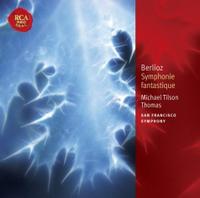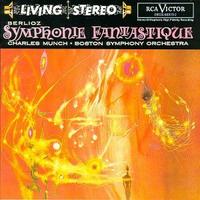Berlioz: Symphonie Fantastique


Berlioz: Symphonie Fantastique
Boston Symphony Orchestra
Conductor: Charles Munch
San Francisco Symphony
Conductor: Micheal Tilson Thomas
Includes filler: Love scene from Romeo et Juliette (Munch), Lelio/Return to Life (MTT)
Other recordings to watch: Mitropoulos (NYPO), David (LPO), Anserment, Monteux, Bernstein.
These days, Living Stereo CDs are a must grab. You get the best of ensamble/conductor combinations such as Reiner/CSO and the Alsatian Munch/BSO. These CDs rarely, and I mean rarely fall out of expectations and usually are cream of the crops in the market. Already, these CDs are not only remastered on SACD, but on Japanese superCD as well. These CDs are a MUST on library of reference recordings, for music students and fans of great orchestral playing etc. BTW, I didn't get paid by a BMG official to write these reviews. =P
The Munch recording, as I cite an Amazon reviewer - is one of examples of old school French conducting. The tempos are always swift, and tends to accelerate gradually and Munch's expressive podium antics are unlike typical stuff we do listen under the standard "German school" model; metronomic and on the safe side. Here under Munch, the first three movements are lyrical, moving and opposite of "stoic". You might also know that Symphonie Fantastique is an opium trip on a composer's obsession of a woman. Under direction of Munch it DOES sounds like a fantastic drug trip, not as hedonistic as any writings of Hunter S. Thompson in any sense. The "Witches Sabbath" movement is one of the fastest recorded, about eight minutes as opposed to standard ten minutes. Listen to the theme after the Dies Irae interlude and observe how Munch accelerates the tempo faster and faster until the end of the movement. Chaos spirals out of control and even though ensamble playing is pretty much loose, it's an great example of "unbuttoned" orchestral playing.
The Munch recording has been criticised lately and compared with a later recording with MTT/SFS. MTT's recording is even dubbed the best version of Symphonie Fantastique (don't dig this BS until you heard versions from Davis, Monteux at least) While I admit the Munch recording might've been overhyped, the new MTT recording doesn't match the passion of Munch's. I didn't like the detached articulations of the strings in first movement, for example compared with the way Munch coaxes different variations of bowing from the BSO strings. Both waltzes are equally exquisite and both had great harp playing at the beginning of the movement. MTT's pastoral third movement sags here as typically with most conductors. It is no surprising it becomes schmaltzy, self-indulgent tune of puppy love but under Munch; played with more flowing tempo, he brings off pastorale, country charm intertwined with sense of longing. The "Looney Tunes" intonation of the BSO brasses might be a turn-off to some people accustomed to full-blooded Wagnerian brasses, but by no means it's bad playing. Now MTT's band shines at these last two movements. The chilling E-Flat clarinet is at it's frightening best here, not even the BSO player could match.
If you happen to spot the recordings, give them some quality testing before purchasing. I still need to acquire recordings from Sir Colin Davis, Ansermet, Monteux and the elusive Mitropoulos (his Romeo et Juliette is classic). You can literally smell the "perfume" of Love in the "Love Scene" filler from Romeo et Juliette, although I still have affection for the Mitropoulos recording (review coming up). I thought the Lelio was forgettable, even as a "sequel" to Fantastique, you can well do without it.
I very much prefer Munch's recording even though MTT excels in the last two movements better for most people. But Munch's "eccentric" conducting for Witches Sabbath made me forget the cartoonish intonation of the brasses for once. There are also versions 1954 and 1964 for this work under Charles Munch and BSO.
Munch/BSO
Technical: 9
Interpretation: 9
Recording: 8
MTT/SFS
Technical: 8
Interpretation: 7
Recording: 8
